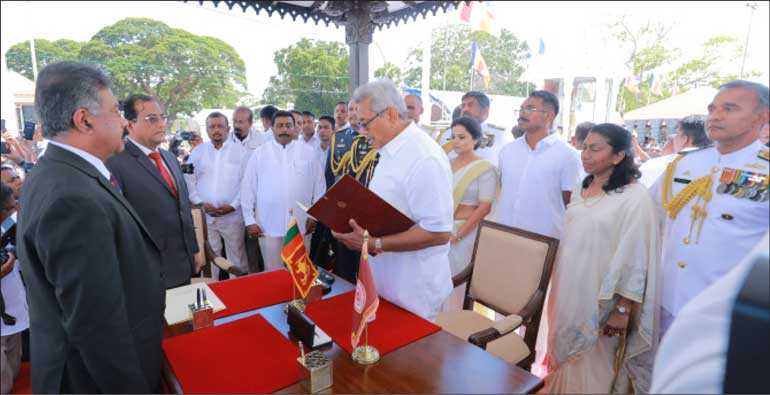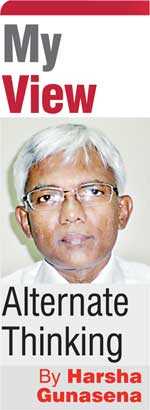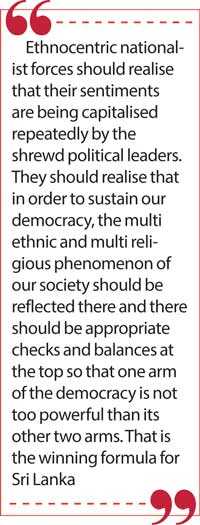Thursday Feb 19, 2026
Thursday Feb 19, 2026
Friday, 30 October 2020 00:00 - - {{hitsCtrl.values.hits}}

The President went to Ruwanweliseya to take oaths and said that he was elected mainly from Sinhala Buddhist votes
History repeats itself. The phenomenon we have experienced soon after the 2010 election was repeated at the passing of the 20A in the Parliament. 
The Presidential Election of 2010 was fought on the lines of war victory. The question was who the war hero was, whether it was Commander-in-Chief Mahinda Rajapaksa or Commander of Army Sarath Fonseka.
The majority of the Sinhalese decided that the Commander-in-Chief was the war hero. Ironically Tamil nationals who were at the receiving end of the war were forced to vote for the Commander of the Army who fought the war against LTTE which represented the political rights of the Tamils, since they did not have a choice.
Ranaviruwo
Soon after the end of the Presidential Elections the ex-Commander of the Army and the defeated opponent candidate was arrested and dragged along the floor when he refused to surrender to a junior officer. Along with him several service personnel in uniform along with ex-service men were arrested.
This treatment to the Ranaviruwo, as they were elevated in the social rank, was a shock to many; especially under the circumstances that the war victory was the main component of the election victory and the war veterans and even the ordinary soldiers were treated with respect and dignity, it was a shock. This mentality was partially inherent from the masses and partially was put into their heads in election propaganda.
There were many requests from society especially from the Bhikkus to pardon Fonseka since he played a pivotal role in war but the rulers did not listen. By their very act they undermined the status of the society to the Ranaviruwa which was created by themselves to their advantage.
At the Presidential Election 2020, the election campaign was carried out on many issues including security, but eventually it was reduced to ethnic and religious lines. The voting pattern was sharply divided on the ethnic lines. There was no marked difference in the General Election.
The President went to Ruwanweliseya to take oaths and after the General Election the Cabinet took oaths at the Magul Maduwa at Dalada Maligawa premises. The President after taking oaths said that he was elected mainly from the Sinhala Buddhist votes. He also said that he would be the President of all who voted for him as well as who voted against him. However, President was giving strong signals that he would listen to the advice of Maha Sangha.
20A
When the 20A came one of the major issues for the ethnocentric nationalist forces was dual citizenship issue. Ministers G.L. Peiris and Ali Sabry argued in the Parliament at the 20A debate that citizens of Sri Lanka even though they were dual citizens they should have the full rights of a citizen and otherwise it was unfair. This is not the case all the time.
The United States is a country which allows dual citizenship, but those who become dual citizens have to renounce allegiance to the other country. Moreover under Section 1 of Article II of the US constitution no person except a natural born Citizen, or a Citizen of the United States, at the time of the Adoption of this Constitution, shall be eligible to the Office of President; neither shall any Person be eligible to that Office who shall not have attained to the age of 35 years, and been 14 years a Resident within the  United States.
United States.
British Prime Minister Boris Johnson is a citizen of US as well. He was born in US so that if he spent 14 years in US, he will be eligible to become US President. There are more than 50 countries which accept the dual citizenship.
Ethnocentric nationalist mindset
The most dangerous part of the 20A is that it allows the President to interfere with the activities of the Parliament and the Judiciary, the other two main arms of democracy. This was not addressed by the ethnocentric nationalist forces. They were caged in the petty ethnocentric nationalist mindset and concerned on the issues such as dual citizenship.
Their problem is that either in the Parliament or in the Judiciary there can be minorities but in the executive arm there can be only a Sinhala Buddhist so that they do not mind to divulge whatever the power to that individual since he or she would be an “our man or woman”. What if that person is a citizen of another country as well? They cannot simply allow that to happen.
In India there were several Prime Ministers from different minority ethnic and religious groups. The USA produced its first black President few years back. The present Prime Minister of UK is a citizen of USA as well. The power enjoyed by the leaders of these countries are always subject to appropriate checks and balances.
Rational arguments were put forward by many Bhikkus including the General Secretaries of Ramanna Nikaya and Amarapura Nikaya and the Catholic Bishops Conference against the 20A.
Visible contradiction
The Government finally had to rely on the Opposition minority Muslim MPs to get the 20A passed while many Bhikkus who supported the establishment of this Government opposed it. The Government and the ethnocentric nationalist forces who supported and ideologised the winning formula of the Government at the elections intentionally created a hatred towards the minorities, especially towards Muslims. Those very Muslims were needed to support the 20A which was opposed by those very ethnocentric nationalist forces.
That is the visible contradiction. This is similar to what happened after 2010 Presidential Elections. Although those are visible contradictions, those are not so in reality. They are just tools in the game to secure and establish power.
Therefore, ethnocentric nationalist forces should realise that their sentiments are being capitalised repeatedly by the shrewd political leaders. They should realise that in order to sustain our democracy, the multi ethnic and multi religious phenomenon of our society should be reflected there and there should be appropriate checks and balances at the top so that one arm of the democracy is not too powerful than its other two arms. That is the winning formula for Sri Lanka.